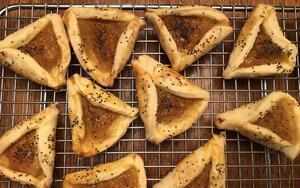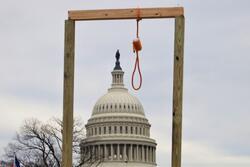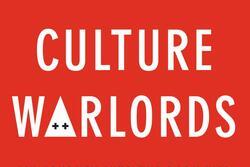The Politics of Holiday Preparation
Justine Orlovsky-Schnitzler is JWA's politics writer.
A few months ago, I earmarked Claire Saffitz’s recipe for apricot and Earl Grey hamentashen from her cookbook, Dessert Person, which my partner, Max, bought me for Hanukkah. The night I opened the gift, dog-eared the page with the recipe and made a mental note to Google when Purim would fall in 2021. By the time January rolled around, I was already thinking about my Passover menu. I expect by the time this piece goes live, I’ll be planning Shavuot.
Yes, I’m neurotic. But I also know that if I don’t plan, the holidays won’t look how I want them to look. It’s impossible to pin down how much of that desire is shaped by Instagram, or by a longing for normalcy in a liminal and frightening time, or an obligation to uphold tradition. The one thing I am sure of is that the execution of holidays—and ritual more broadly—is political. The way we navigate “success” in celebration is framed by gender, age, socioeconomic divide, our relationships to others, and our own sense of self.
A graduate colleague of mine, KC Hysmith, researches women’s food history, and gamely agreed to talk through some of my questions about the politics of women’s work and labor in creating celebration. She told me, “All of these things, the details, the minutiae, are small parts of a complex, interwoven tapestry of embodied knowledge...that make up the foundation of food studies.” This idea of embodied knowledge put into words something I had previously felt, but hadn’t named—I have skills that I seem to have obtained in some respects, through societal osmosis. As KC listed some of these embodied skills (“label reading, recipe knowledge, cooking knowledge, how long produce lasts, how much to buy”) I laughed in recognition. However, as KC noted, "there are so many invisible labors that food studies scholars can't possibly cover them all," and cultural factors, like differences in race, all impact the labors people learn and perpetuate. With all this in mind, I also began to recognize that inheriting the responsibility for this labor is both a gift and a burden. KC put things succinctly: “It speaks to the larger systemic issues that continue to plague women's food-related labor, especially around the holidays.”
I’ve been writing the politics beat for JWA for the last few months—and before that, I wrote about whatever touched my life in a feminist and Jewish way (a whole lot). In fact, almost two years ago, I wrote a piece about making Passover happen. It was the first year I lived out of my home state, and Max and I were navigating a shared adulthood with wide-eyed enthusiasm. Tasks like painting our kitchen and cleaning baseboards and coming up with weekly meal plans still felt like fun micro-challenges, rather than chores.
“Despite the fact that I’ve vastly overcommitted myself,” I wrote in 2019, “I’m secretly enjoying the stress that comes with executing a large event. I am excited by the thought of finally settling in at the head of the table, watching people I care about try the dishes I’ve labored over. I am thrilled by the prospect of being a quasi-expert for the evening, of sharing the story of Passover as an adult amongst friends.” I remember that night fondly—all the more so because we are almost a full year into a pandemic that has put a hold on dinner parties entirely. I miss pouring wine into my friends’ glasses, inches from their faces, more than I can put into words. But if I dig a little deeper, I remember the frustrations, too—the text messages back and forth with friends to source a Seder plate, the calculations needed to keep various dishes warm while we plowed through our Haggadah, the anxiety about being in “charge,” about conducting a dance that was neither mandatory nor monitored. “The idea of aesthetics or adhering to a specific or expected aesthetic adds an entirely new level of pressure,” KC said, when I asked her about the elements of holidays that feel like performance. “A holiday needs a few specific things to really be considered a holiday (specific holiday foods, guest list, culturally expected date/time), but aesthetics, especially those we are constantly bombarded with via social media, add additional layers of details that aren't explicitly necessary, but we've been conditioned to think they are.”
This isn’t a piece about cis male participation (or lack thereof) in holiday preparation—though those aforementioned gender dynamics are absolutely a component of any discussion of the politics of food, aesthetics, and performance. Max is ready and willing to help when asked—and offers to do so unprompted, too. The problem lies with my own expectations and my own standards. Trying to unravel their origins, to loosen their grip, to sift through the pressure and find what it is that I want for myself, is nearly impossible. I don’t want to assign my partner the task of coming up with the menu, because I want to be the one to nail the details. At least, I think I do. It’s an exhausting cycle. But, I’m also frustrated on behalf of the people who have been “gendered out” of a lifetime of slowly accumulating skills we all need to feed ourselves, and feed ourselves well.
KC spoke to this shared sense of exhaustion, too: “This year, with the pandemic taking away so much joy, we indulged ourselves in so many holidays both big and small, but it was still all on me. There's that saying or thought that what really matters is the experience, that that is what people (especially the kids) will remember. And while I think that is cheesy and oversimplified, because some of us love details and fixate on those little things, it is okay to find a balance somewhere in between. A focus on the experience as well as a few details that are achievable and make you (the planner) happy. I've also found, in this era of pandemic holiday planning, that a solid day of rest (absolute rest) is necessary.”
I couldn’t agree more. At this moment, I’m working hard to balance expectation, obligation, and personal excitement—nurturing joy, and also honoring frustration as I try to craft celebrations that don’t feel like I’m just ticking a box. In the end, I made the apricot hamantashen for Purim on my own schedule—a day ahead of the rest of the world, and with little fanfare. They fell apart in the oven (I’ve never been great at folding the corners) and weren’t Instagram-worthy. I dropped them off, masked, on the front steps of friends’ homes. They got eaten, and they tasted good. What more could I want?








